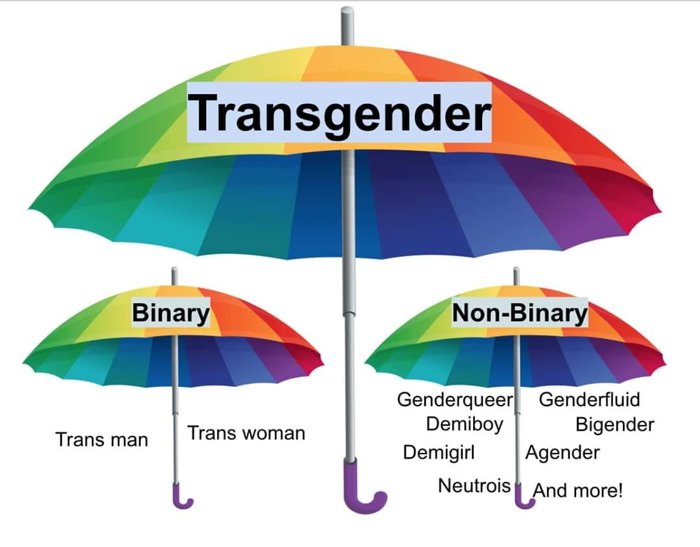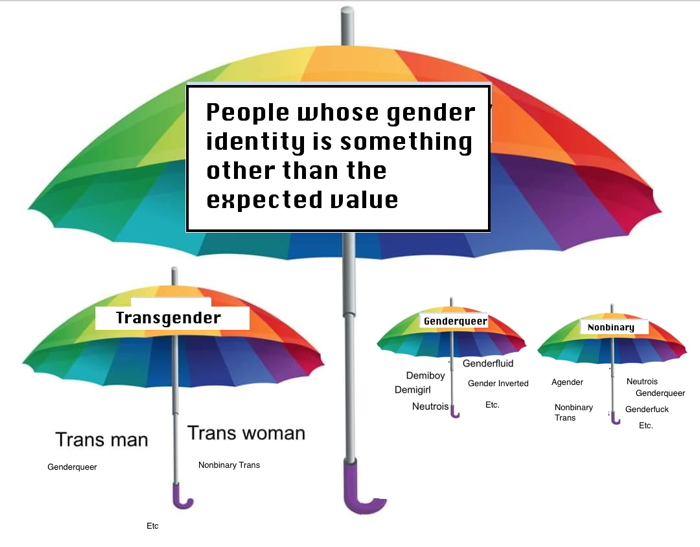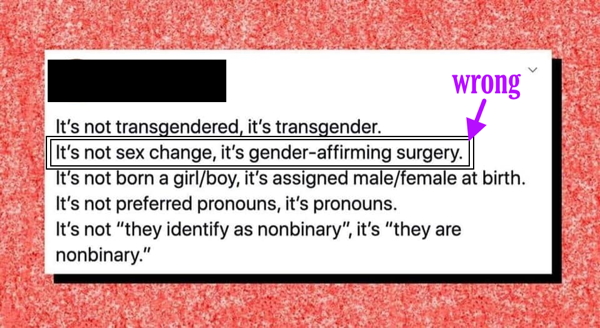You know that a tomato is a fruit, yes? A fruit is a ripened flower ovary and it contains seeds. I often feel like a tomato in a world where fruits are generally sweet and vegetables are generally savory. I clearly fit in with the veggies, but my fruitness isn't invalid or wrong, I really am a fruit. It would be wrong to measure me against oranges and lemons and strawberries and say "Ewww, this tomato isn't sweet AT ALL, it completely flunks as a fruit!" because I don't aspire to those standards. I want to be measured against the potatoes and onions and kale, where you can see that I shine. But that doesn't mean I want to pass as a vegetable. I'm not ashamed of my seeds. My fruit-ness is every bit as valid as my savory-ness and dammit you folks have got to get over your attitude that fruits are sweet and veggies are savory. You have to accept specimens like me as valid in our own right.
Let's talk about dysphoria for a moment. Author Julia Serano makes an important distinction between being alienated from one's own body structure and being unhappy about other folks' social expectations:
Perhaps the best way to describe how my subconscious sex feels to me is to say that it seems as if, on some level, my brain expects my body to be female...
I am sure that some people will object to me referring to this aspect of my person as a subconscious "sex" rather than "gender.". I prefer "sex" because I have experienced it as being rather exclusively about my physical sex, and because for me this subconscious desire to be female has existed independently of the social phenomena commonly associated with the word "gender".
— Julia Serano, Whipping Girl pgs 80, 82
The common phrase is "gender dysphoria" but in light of what Serano is specifying here, I'm going to replace that term with "sex dysphoria".
Now let's talk about sexist stereotypes, and feminists, gender-critical feminists and even the feminists who nowadays get called "TERFs". They reject sexist expectations and sexist restrictions, you know that, right? Well, even the ones who don't spend their energy arguing against transgender people's identities often find it hard to understand dysphoria. "Oh, I hate to see so many people feeling like in order to be the kind of person they are, they have to reject their body", they will say. "Don't they realize that if we got rid of sexist attitudes, there wouldn't be a different set of expectations foisted off on you depending on whether your body has a penis or not?"
So their ideal world would get rid of those sexist social attitudes, which would mean that if your body was of the sort that gets designated female, you would not be expected to be alluring and seductive, nurturant and sensitive and understanding, verbal and emotional, delicate and able to be vulnerable without severe discomfort. Nor would you be expected to be decisive and authoritative, bluntly-spoken and aggressive, rationally logical and spatial, and bravely courageous in the face of frontal attacks, for that matter.
But that would not fix the dysphoria that Julia Serano is talking about. Do you see that?
So we're talking about two separate things here: sex dysphoria and sexist expectations.
Now follow me, because we're doing to dive right between them.
Check out the elementary school classroom, 4th grade.
Many girls who in 4th grade were happy with and proud of their bodies internalize a lot of social messages — from fashion magazines, diet ads, beauty contests, Instagram and Tik Tok, from their peers and their parents — that they should be skinny and slender and waiflike. And by 8th grade many of these same girls hate their bodies, consider their bodies to be *all wrong*.
From the outside we say "there is nothing wrong with this person's body, the problem is with harmful social messaging that has made her feel otherwise", but that's not how the anorexic herself sees it. We realize that and along with that we realize that we need to provide positive body-confirming alternative messages if we want to make this phenomenon dissipate; we realize that saying "Oh c'mon, girl, you are mentally ill to think that, and by going around repeating that you're too fat you are contributing to the harmful message that's got you destroying yourself" would not be productive, and surely would not be supportive.
I bet you see where I'm headed with this. This is a person who would be okay with her body if it weren't for society's messaging, but because of society's messaging is not okay with her body. And yes, this can happen with gender messaging the same way.
SOCIAL DYSPHORIA is where a person would be okay with their body if it weren't for social messaging — sexist expectations to use the feminist terms — but BECAUSE of social messaging has come to hate their body and to see it as being wrong for them.
This phenomenon definitely exists.
Saying it exists doesn't erase the realness of the kind of dysphoria that Julia Serano talks about. So it has to be okay within the trans community to recognize it, and to not see this as an attack on their trans identities.
Julia Serano ALSO wrote:
Perhaps the most underacknowledged issue with regard to the transgender community... is the fact that many...strategies and identities that trans people gravitate towards in order to relieve their gender dissonance are also shared by people who do not experience any discomfort with regards to their subconscious and physical sex....
— Julia Serano, Whipping Girl pgs 27-28
Neither the feminist community (which often tends to reject transgender people for their apparent rejection of feminist understanding of sexist expectations being the problem, not the body) nor the transgender community (which is often suspicious of any perspective that looks like it might invalidate transitioning) has provided much of a home for folks whose problem is social dysphoria.
I don't have social dysphoria myself. They didn't get to me. They didn't make me reject my body. I'm a proud tomato.
I get to be an activist. I get to tell people that YES your gender identity doesn't have to match your physical sex.
It doesn't make me a transphobic TERF and it also doesn't make me an antifeminist person who is propping up gender ideology. If what I've written upsets you on occasion, check your own privilege as a participant in a social voice that's larger than mine is.
———————
You're secluded in quarantine, and all the performances and events have been cancelled, so it's a good time to read a book!
My book, GenderQueer: A Story From a Different Closet, has been published by Sunstone Press. It is available on Amazon and Barnes & Noble in paperback and ebook, and as ebook only from Apple, Kobo, and directly from Sunstone Press themselves.
Links to published reviews and comments are listed on my Home Page
———————
This DreamWidth blog is echoed on LiveJournal, WordPress, and Blogger. Please friend/link me from any of those environments on which you have an account.
————————
Index of all Blog Posts




